South Africa's songs of power
- Published
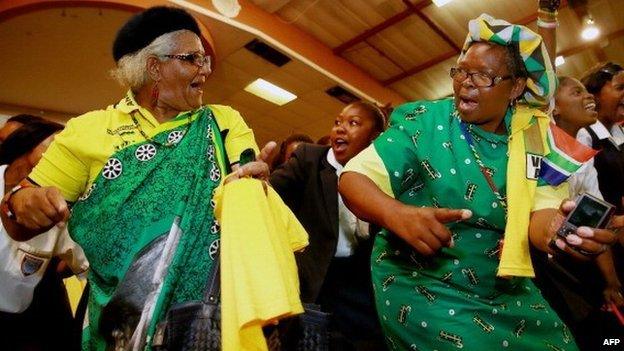
During the struggle against white-minority rule in South Africa, songs played a vital role in galvanising popular support and boosting the morale of protesters. Twenty years after the advent of democracy, they are still a big part of this year's election.
Many of the political songs are based on the call-and-response pattern used in many churches.
Crowds, often numbering in their thousands, of all ages, join in, creating a feeling of immense strength and unity. Jacob Zuma was well known as a singer and was loved at rallies but he has toned down his performances since becoming president.
As the party which led the battle against apartheid, many of the old songs are associated with the governing African National Congress (ANC) but its challengers have composed their own songs.

Nkosi Sikelela' iAfrica (God Bless Africa)
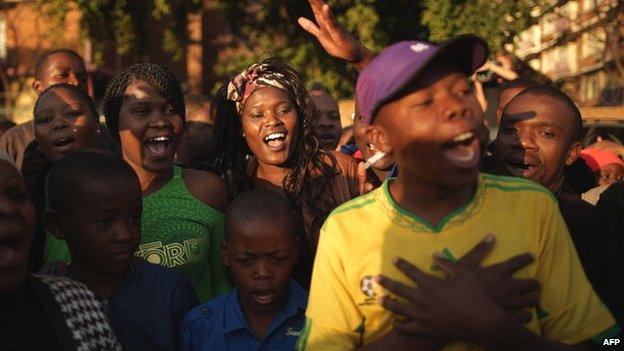
The national anthem, Nkosi Sikelela' iAfrica (God Bless Africa), external, has a long history as a protest song.
Written by Enoch Sontonga, a teacher and preacher from the Eastern Cape province, it came to feature prominently at the ANC's secret meetings.
Although written some 15 years prior to the formation of the ANC in 1912, the party's founding president John Langalibalele Dube introduced it at their gatherings and it became the party's anthem.
The ruling party's former chief whip Mathole Motshekga says struggle songs originated from the courses of colonialism, slavery and apartheid which is why the earliest songs had a "religious character".

Dubul'iBhunu (Shoot the Boer)
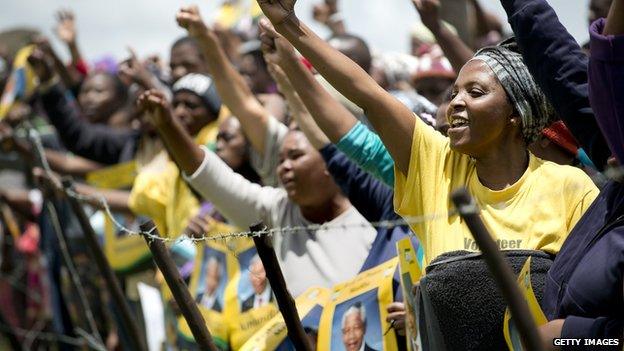
Dubul'iBhunu being sung by Julius Malema, before he left the ANC
But some songs were and remain controversial in certain quarters.
Dubul'iBhunu, which means Shoot the Boer (Afrikaner), was banned in 2010 from public gatherings after a court ruled that the song amounted to hate speech.
AfriForum, a predominantly Afrikaner civil society organisation, complained that the sang incited violence against Afrikaners and white farmers.
But its originators defend the song, saying its meaning has been misconstrued.
"You see African culture is idiomatic; it uses symbols and proverbs to express the truth. Dubul'iBhunu is not literal. At the time of apartheid iBhunu [Boers] symbolised a system, it was about fighting a system, not fighting white people," says Mr Motshekga.
"Our struggle has always been informed by the fact that the conqueror and the conquered were both victims of the apartheid system. The courts were not educated in struggle culture and are not able to understand the spirit of freedom songs."

Hamba Kahle Mkhonto we Sizwe (Go Well Spear of the Nation)
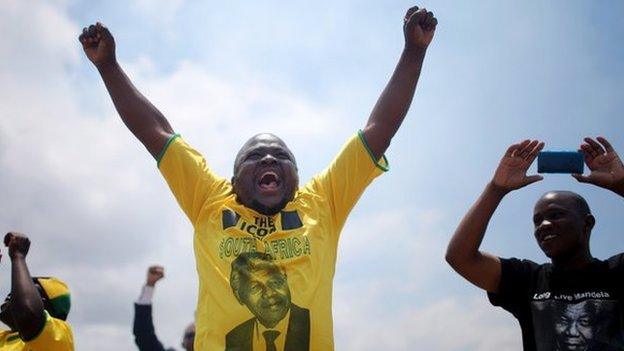
Hamba Kahle Mkhonto we Sizwe sung by Nelson Mandela, among others, at a 1993 ANC funeral
By the 1960s, after years of demonstrations, there seemed to be no end in sight for the struggle for equal rights.
The ANC's armed movement, Umkhonto we Sizwe (Spear of the Nation) was formed in 1961, after a series of incidents including the Sharpeville massacre, where 69 people were killed during a protest. The songs of this period reflect this.
At the funerals of members of the party's armed wing, mourners would sing Hamba Kahle Mkhonto we Sizwe (Go Well Spear of the Nation).
The song continues: "We the people of Mkhonto are prepared to kill the Boers."
It was sung at the funeral for Nelson Mandela, the country's first black president, last year.

Nyonyobane (Stalk Them)
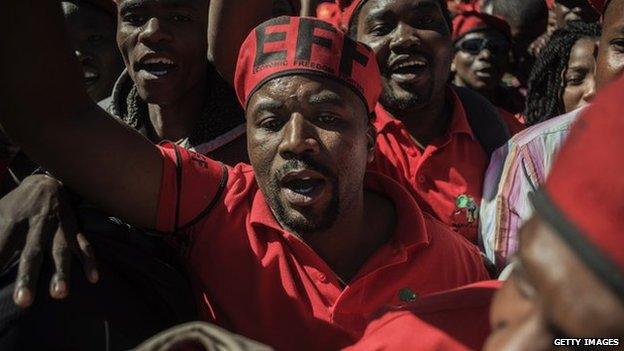
Nyonyobane describes Julius Malema as the ultimate hero
But the ANC is not the only party to take pride in its songs.
One such party is the Economic Freedom Fighters (EFF), formed by Julius Malema last year following his expulsion from the governing party.
The EFF boasts a collection of professionally recorded songs, such as Nyonyobane, sung by party supporters.
It is about taking back Africa from the oppressors. The song describes Mr Malema as the ultimate hero. One of the lyrics is a call to soldiers to stalk the enemy, like a predator with a machine-gun in hand and take back the land.
Thupa eyetla. Zuma oa bona thupa?
It is not uncommon for party members to sing an impromptu song taking a swipe at President Zuma, Mr Malema's former ally, now turned foe.
Thupa eyetla. Zuma oa bona thupa? loosely translated, means: Zuma, the punishment is coming - can you see it?

Mabayek'umhlaba Wethu (Let Them Return Our Land)
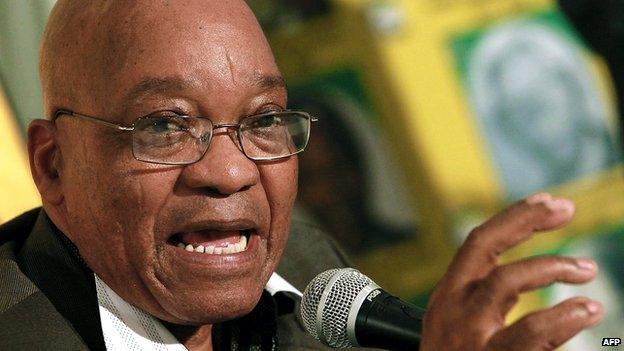
President Jacob Zuma sings Mabayek'umhlaba Wethu
Land remains an extremely emotive issue in South Africa, after the 1913 Natives Land Act restricted black people from buying or renting land in "white South Africa".
One of the songs to address this issue is Mabayek'umhlaba Wethu (Let Them Return Our Land).
Its lyrics include this line, translated from Zulu: "We, the black nation are weeping for our land".
The EFF wants to speed up the process of land redistribution.

Asoze Saphela Amandla (We Will Never Give Up)
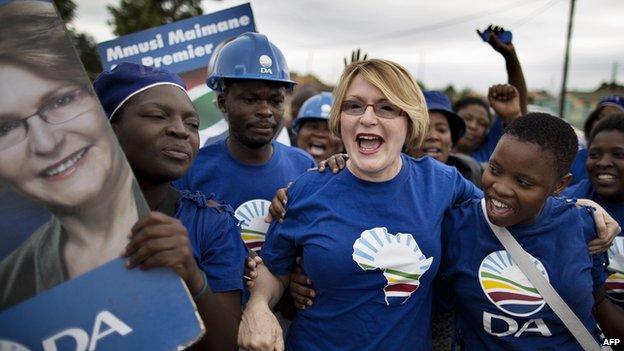
The official opposition, Democratic Alliance says it hopes to use music to celebrate its political journey
The main opposition party, the Democratic Alliance (DA), has been struggling to shake the tag of being a "white" party and also seems to understand the importance of songs in political South Africa.
One of its favourites is an old church hymnal-come struggle song Asoze Saphela Amandla (We Will Never Give Up).
Supporters of the Democratic Alliance sing a song critical of Jacob Zuma's government
The DA's premier candidate for Gauteng province Mmusi Maimane says music has always been a vehicle of hope and he believes it is crucial to the country's political journey.
"These songs remind us of how far we have come. They remind us of our terrible history but yet give us hope that we have the strength to overcome. They are part of our history and will remain part of South Africa's story," he says.